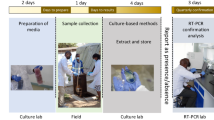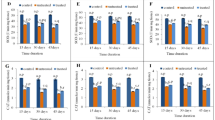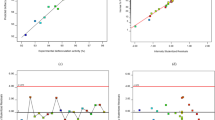Abstract
WE have shown1 that diphtheria toxin with a value of 150–200 flocculating units per ml. can be obtained by growing the Park–Williams No. 8 strain of C. diphtheriae as a submerged culture, using a tryptic digest medium based on that described elsewhere2. The volumes employed were 10–14 litres of medium, and the vessels were of glass, with stirrers made of either ‘Birmabright’ (a magnesium–aluminium alloy) or aluminium.
This is a preview of subscription content, access via your institution
Access options
Subscribe to this journal
Receive 51 print issues and online access
$199.00 per year
only $3.90 per issue
Buy this article
- Purchase on SpringerLink
- Instant access to full article PDF
Prices may be subject to local taxes which are calculated during checkout
Similar content being viewed by others
References
Linggood, F. V., Matthews, A. C., Pinfield, S., Pope, C. G., and Sharland, T. R., Nature, 174, 557 (1954).
Linggood, F. V., and Fenton, E. L., Brit. J. Exp. Path., 28, 354 (1947).
Chain, E. B., Paladino, S., Callow, D. S., Ugolini, F., and Van Der Sluis, J., Bull. World Health Org., 6, 73 (1952).
Author information
Authors and Affiliations
Rights and permissions
About this article
Cite this article
LINGGOOD, F., MATTHEWS, A., PINFIELD, S. et al. Production of Diphtheria Toxin in Submerged Culture. Nature 176, 1128 (1955). https://doi.org/10.1038/1761128a0
Issue date:
DOI: https://doi.org/10.1038/1761128a0
This article is cited by
-
Dehydrogenase activity and toxinogenesis of a production strain ofCorynebacterium diphtheriae during submerged cultivation
Folia Microbiologica (1966)
-
The fractionation of diphtheria toxoid by means of ammonium sulphate
Antonie van Leeuwenhoek (1963)
-
Production of Staphylococcal Coagulase in Stirred and Aerated Culture
Nature (1962)
-
Production of High-Titre Diphtheria Toxin in Baffled Shake Flasks
Nature (1958)



